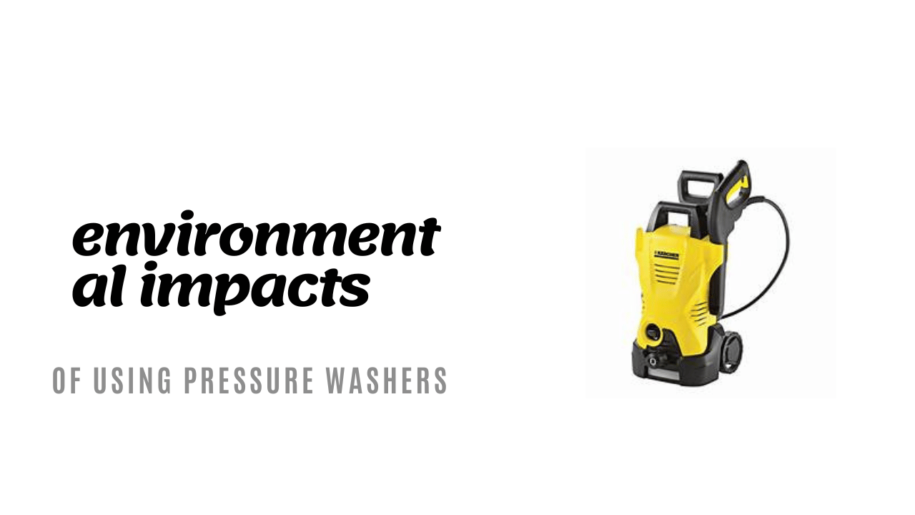
Pressure washers are popular tools for cleaning surfaces like driveways, siding, and vehicles. They use high-pressure water streams to remove dirt and grime quickly and effectively. While pressure washers can be incredibly helpful, it’s important to consider their environmental impacts. This article explores how pressure washers affect the environment and provides tips on minimizing negative consequences.
Water Consumption
One of the major environmental concerns with pressure washers is the amount of water they use. Although they are often touted as water-saving devices compared to using a standard hose, pressure washers can still consume a significant amount of water. For example, while a garden hose might use around 20 liters of water per minute, a pressure washer can use between 8 to 15 liters per minute depending on the model.
This might seem like a saving, but extensive use over large areas can lead to substantial water use.
Chemical Runoff
Pressure washers often require the use of detergents and chemicals to effectively remove oil, grease, and other stubborn stains. These chemicals, if not chosen carefully, can be harmful to the environment. When washed away, these chemicals enter drains and eventually waterways, potentially harming aquatic life and polluting water bodies. The use of non-biodegradable chemicals can have long-lasting effects on local ecosystems.
Noise Pollution
Pressure washers generate a significant amount of noise, which can be considered an environmental nuisance, especially in quiet residential areas. The noise generated by gas-powered pressure washers is particularly high compared to electric ones. Frequent exposure to high noise levels can disturb local wildlife and affect their behavior and habitat.
Air Pollution
Gas-powered pressure washers emit exhaust fumes, contributing to air pollution. These emissions include carbon monoxide, nitrogen oxides, and particulate matter, which can harm human health and contribute to atmospheric issues like smog and acid rain. For those concerned about air quality, electric pressure washers may be a more environmentally friendly option, though they still require energy that may come from non-renewable sources depending on the local electricity mix.
Energy Use
While electric pressure washers don’t produce emissions at the point of use, they do require electricity, which in many areas is generated from fossil fuels. The production of this electricity contributes to greenhouse gas emissions, albeit indirectly. Choosing a pressure washer with high energy efficiency or one that can be powered by renewable energy can mitigate some of these impacts.
Tips for Minimizing Environmental Impact
- Use Water Efficiently: Opt for a pressure washer that has adjustable pressure settings to minimize water use. Only use the pressure washer when necessary and turn it off between cleaning sessions.
- Choose Eco-Friendly Chemicals: Select biodegradable and environmentally friendly cleaning agents. These products are designed to break down more quickly and reduce harm to the environment.
- Maintain Your Equipment: Regular maintenance can help ensure that your pressure washer operates efficiently, using less water and energy and minimizing the risk of chemical leaks.
- Consider Noise Levels: If you live in a residential area, consider using a quieter electric model and limit use to reasonable hours to reduce noise pollution.
- Proper Waste Disposal: Follow local regulations for disposing of wastewater, especially when using chemicals. This may involve filtering water before it enters storm drains or reusing it in other safe ways.
Conclusion
While pressure washers offer a convenient way to clean various surfaces, it’s important to use them responsibly to minimize environmental impacts. By considering the amount of water and energy they use, the chemicals involved in their operation, and their overall effects on local ecosystems, users can make more informed decisions that lead to better environmental outcomes.
Responsible use and choosing the right equipment are key to balancing effectiveness with environmental protection.




![Pressure Washing Regulations: What You Need to Know [Updated 2024]](https://pressurwasher.com/wp-content/uploads/2024/05/Minimalist-Tutorial-Event-YouTube-Thumbnail-2024-05-31T224409.854-450x253.png)
![Ultimate Guide to Pressure Washer Maintenance [2024 Edition]](https://pressurwasher.com/wp-content/uploads/2024/05/Minimalist-Tutorial-Event-YouTube-Thumbnail-2024-05-30T230638.695-450x253.png)